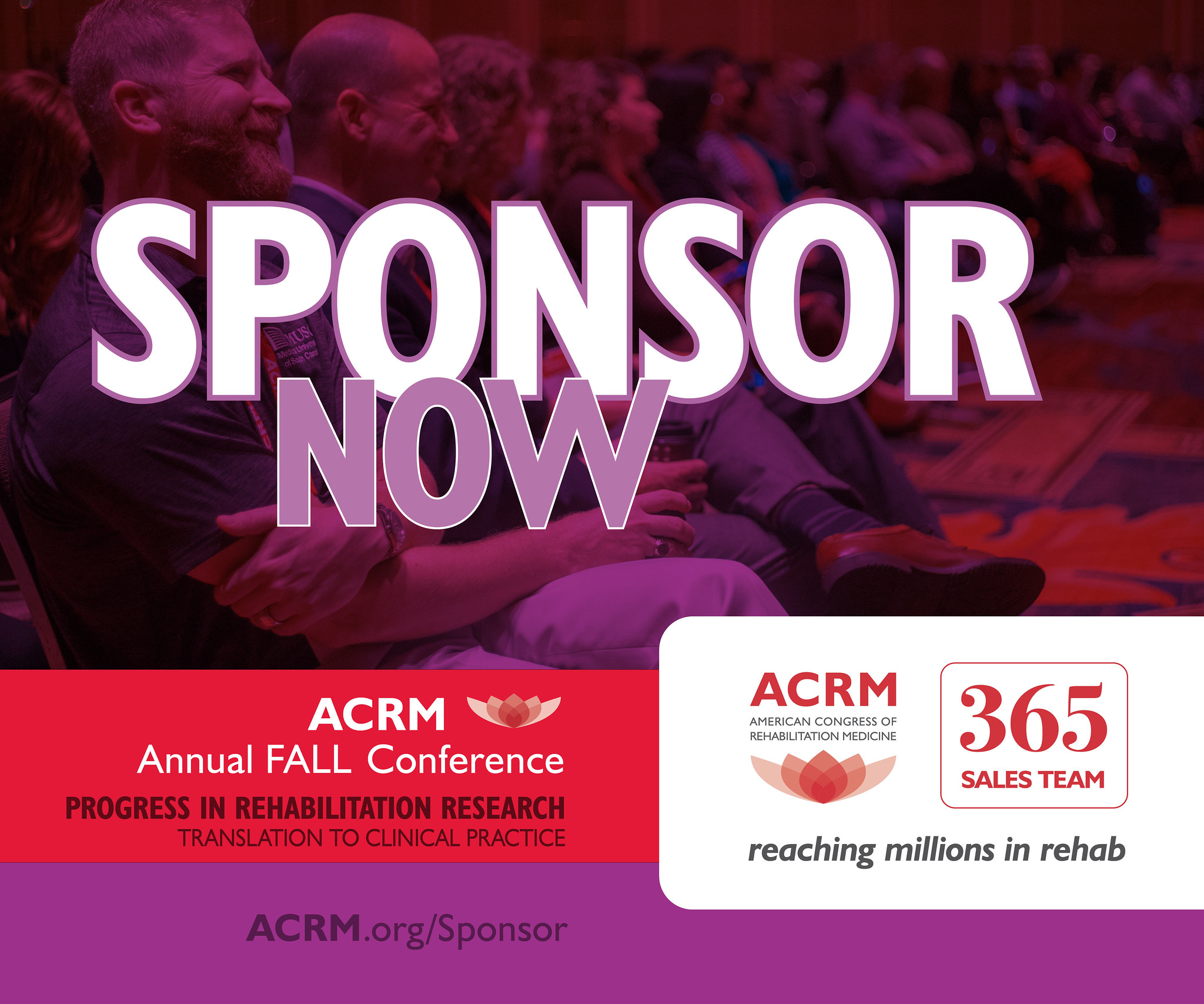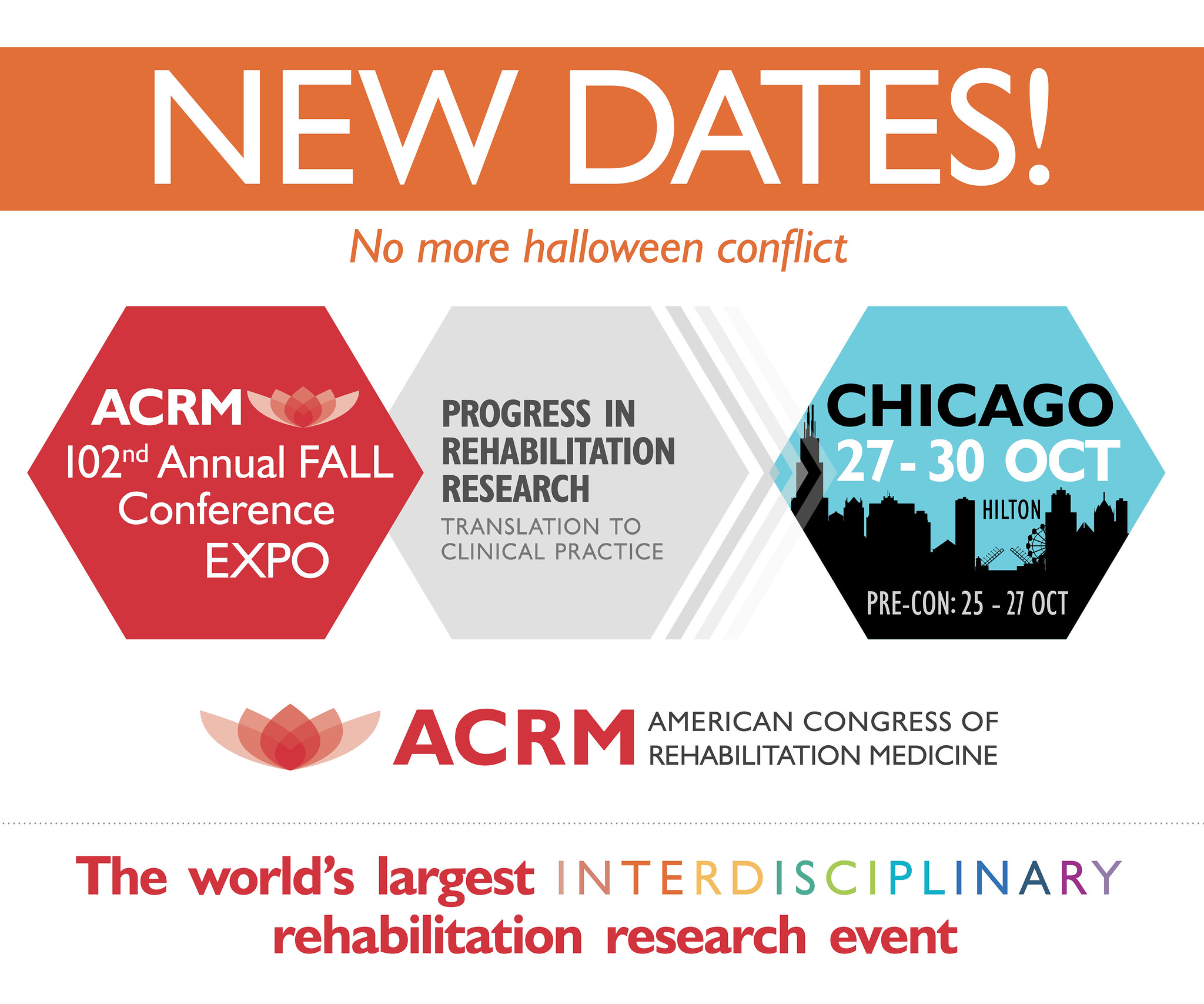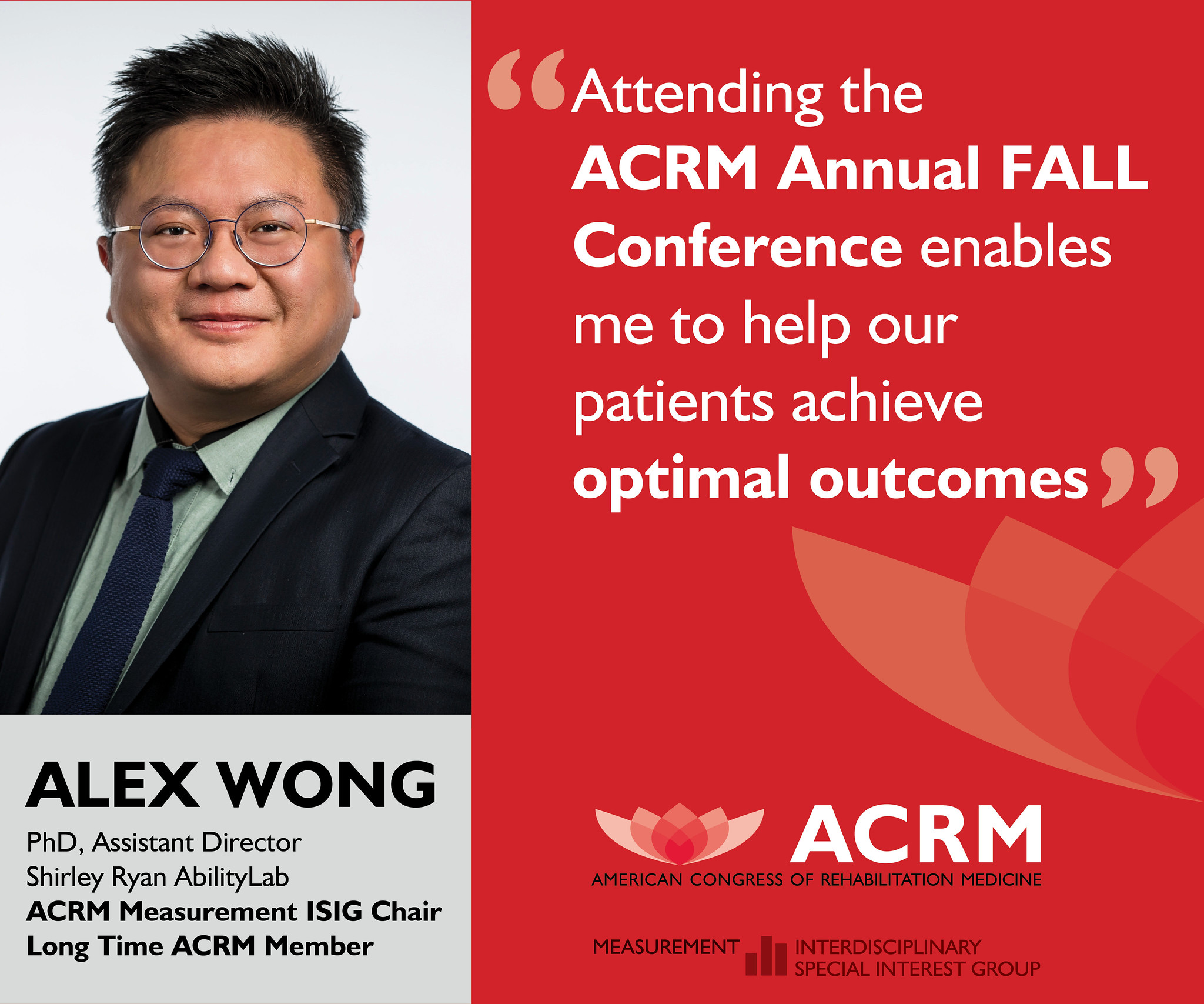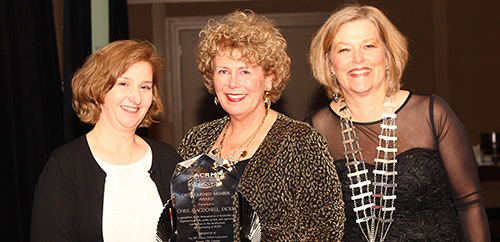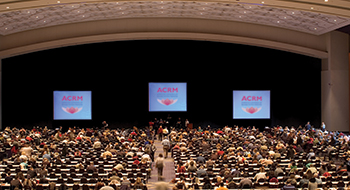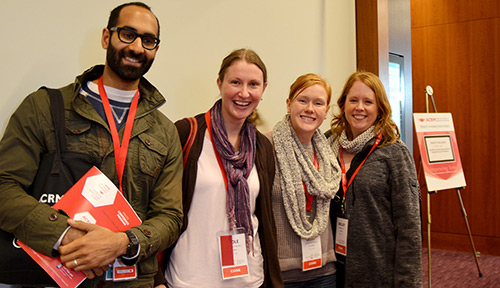Join Us In Chicago!
All conference attendees are automatically ACRM members. Non-members receive a 6-month introductory ACRM membership automatically with registration. Put your member benefits to work right away—join an ACRM community group and attend a community group or task force meeting! PLEASE NOTE: Dates and times are subject to change. Please check the Online Program for the most up-to-date information.
Wednesday 6 NOV
7:00 AM – 8:00 AM
- MNG Curriculum Task Force Meeting (open for ALL to attend)
Location: 4P, 4th Floor
Friday 8 NOV
7:00 AM – 8:00 AM
- Measurement Networking Group Meeting (open for ALL to attend)
Location: 4M, 4th Floor
Plenaries >>
PLENARY IV: Pragmatically Using Electronic Patient Reported Measures to Drive Proactive Rehabilitation Care: Our Future? >>
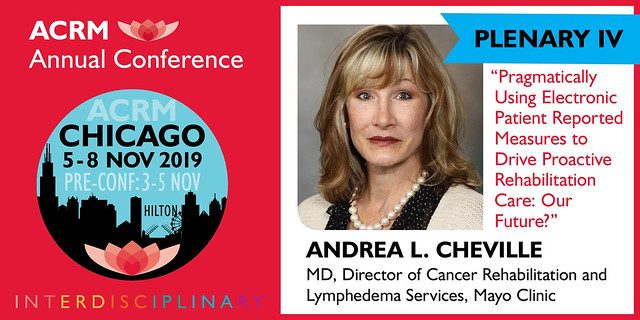
Proactively treating the causes disablement; physical impairments, pain, and related immobility, can significantly prolong patients’ functional independence, improve their quality of life (QoL) and avoid unneeded expensive and extended hospitalizations. Current rehabilitation service delivery models are reactive in nature and tend to focus on catastrophic disability, characteristics that render them ill suited to detect or address early disablement in cancer or any vulnerable patient group. A model that proactively addresses these needs is needed.
Learn more >>
Special Symposia >>
Incorporating Consumer Perspectives in Measuring and Managing Urinary Health Among Those with SCI >>
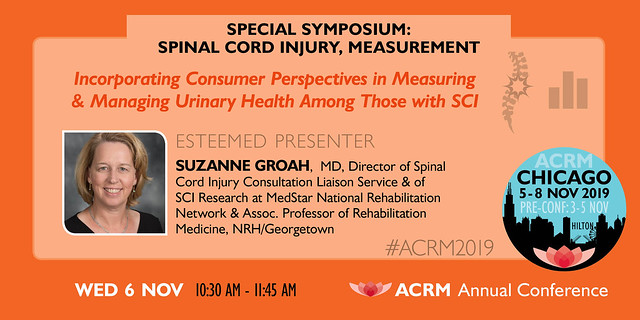
Urinary tract infection, a common condition among those with neurogenic bladder due to spinal cord injury or dysfunction, contributes to decreased life expectancy and inability to participate in community life. This symposium will share findings from patient-centered research projects pertaining to the measurement and promotion of urinary health, and discuss how to accomplish stakeholder involvement in projects in ways that enhance research quality and translation to clinical practice.
Learn more >>
ASA/ACRM Award for Excellence in Post-Acute Stroke Rehabilitation: Biomarkers in Stroke Recovery and Rehabilitation Research >>
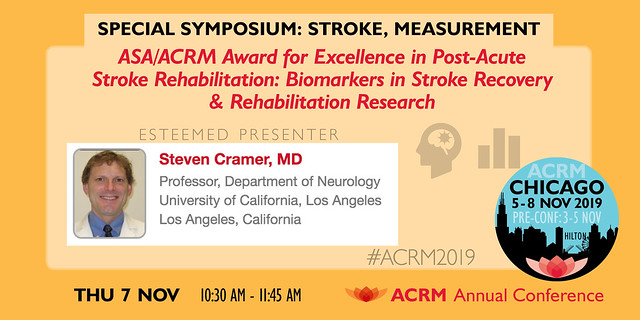
A number of therapies are emerging that aim to promote favorable brain plasticity after stroke, with the goal being to improve outcomes and reduce disability. Treating the brain is not a “one-size-fits-all” process. Instead, certain treatments are more, or less, likely to improve brain function in specific subsets of patients. This presentation will briefly review the range of therapies under study, then focus on measurements that have been evaluated for predicting responders versus non-responders in the context of restorative therapies after stroke, with an emphasis on studies targeting the motor system.
Learn more >>
National Survey of Children’s Health >>
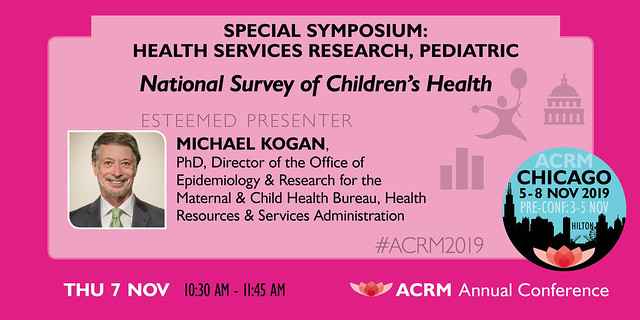
Design and findings of the National Survey of Children’s Health (NSCH) and the National Survey of Children with Special Health Care Needs (NS-CSHCN).
Learn more >>
Are We Ready for Brain Derived Neurotrophic Factor as a Clinical Outcome Biomarker?
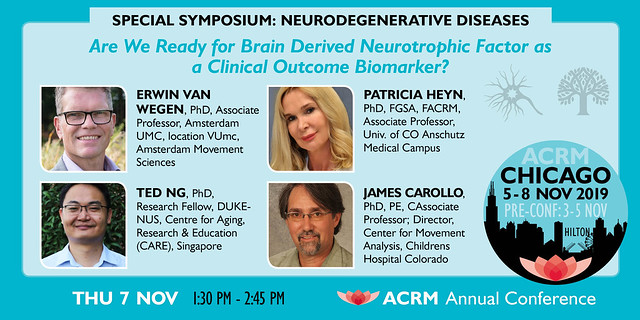
The objective of this symposium is to critically discuss the evidence supporting BDNF biomarker as an important clinical outcome measure in neurodegenerative diseases as well as in health conditions related to cognitive and physical frailty status.
Learn more >>
Instructional Courses >>
IC 3: Moving & Living From the Inner Core: Integrating Alternative Health Principles to Support Clinical Outcomes >>
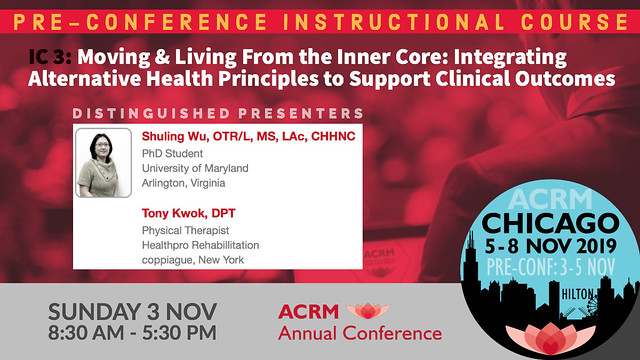
This workshop introduces and discusses how rehabilitation specialists integrate the concept of the “energetic inner core (DanTian)” into rehabilitative practices in order to enhance rehabilitation outcomes. It will focus on the clinical application of eastern medical theory and philosophy on clients with complex chronic pain conditions such as fibromyalgia, chronic fatigue syndrome, complex regional pain syndrome and adhesive capsulitis.
Learn more >>
IC 31: An Introduction to the NIH Toolbox’s Suite of Neurobehavioral Tests and use in Rehab Settings >>
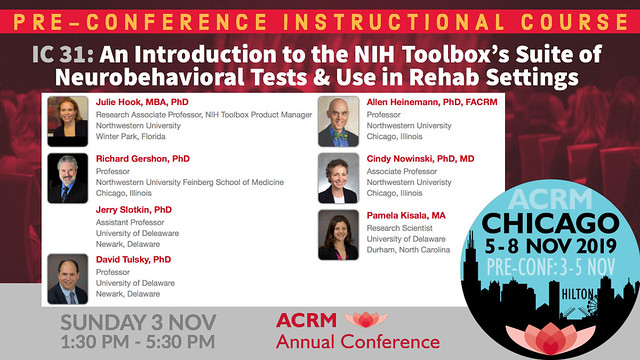
The NIH Toolbox® workshop presents updated research and hands-on demonstration of this cutting edge measurement system to assess neurological and behavioral function. The advantages of employing common measures across rehabilitation research and clinical practice will be addressed. Recent findings with the NIH Toolbox in spinal cord injury, stroke and traumatic brain injury will be described. Participants will acquire the basics of computer adaptive testing and modern psychometric approaches and the building blocks for administration of the NIH Toolbox® measures for emotional, cognitive, sensory and motor function via an iPad.
Learn more >>
International Outcome Measurement Conference (IOMC 2019) >>
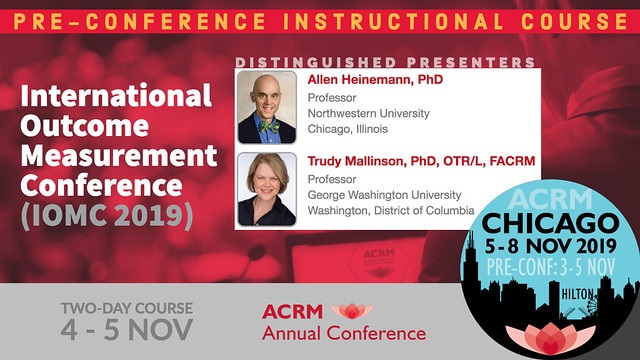
IOMC 2019 is the sixth meeting of the International Outcome Measurement Conference, which has been held 5 times since 1996 and has been an important international event for researchers and health care practitioners who utilize the Rasch Model. Attendance at previous IOMCs has ranged from 50 to 90, from over 12 countries, and 10 rehabilitation/health care disciplines. The goal of IOMC has always been to Promote sound measurement practices in outcome measurement. The conference was founded in 1996 under the sponsorship of Marianjoy Rehabilitation Hospital. Marianjoy also sponsored the second IOMC in 1998. The third IOMC was sponsored by the University of Illinois Chicago in 2001. After a 14-year hiatus, IOMC 2015 was co-sponsored by the Journal of Applied Measurement and MetaMetrics. IOMC 2017 was a joint-effort with the Shirly Ryan AbilityLab and the Journal of Applied Measurement. IOMC 2019 again is a joint-effort with the Shirly Ryan AbilityLab and the Journal of Applied Measurement. Because many members of ACRM MNG also historically attend IOMC, aligning the two conferences maximizes reach and impact of the two organizations.
Learn more >>
IC 5: Interdisciplinary Perspectives to Functional Measurement and Assessment of the Stroke Survivor >>
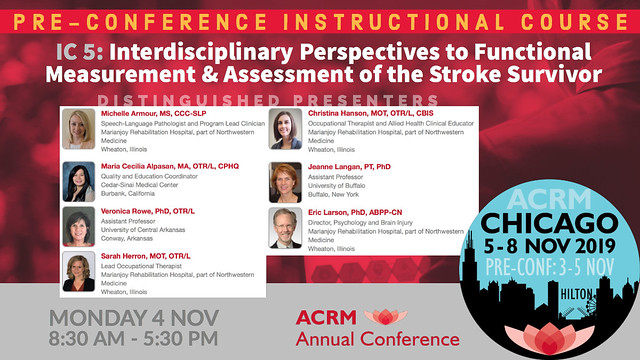
Stroke is one of the leading causes of disability in the United States. Given stroke can affect all aspects of bodily function and abilities, multiple measurements and assessments are administered across disciplines. These measurements are critical in evaluating function and providing effective care for the stroke survivor. Clinical knowledge of various standardized assessments is required of all medical professionals to create effective goals for stroke patients to achieve functional outcomes.
Learn more >>
IC 7: Longitudinal Data Analysis and Practical Workshop Using R: Part I Introductory Topics >>
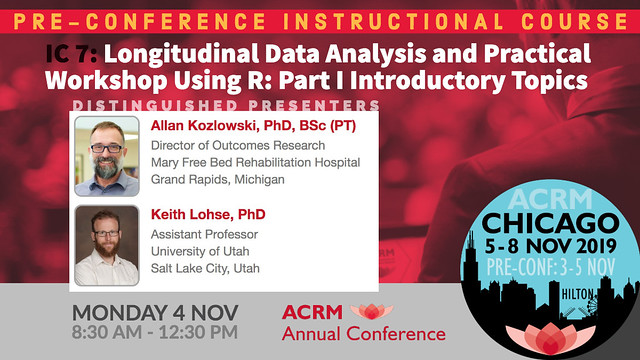
This combination lecture and hands-on workshop will introduce clinicians and researchers to longitudinal model building using linear mixed effects regression (LMER) in the R statistical environment. Rehabilitation outcomes are better suited to multi-level longitudinal modeling than to pre-post regression or repeated measures analysis of variance (RM-ANOVA). LMER has real advantages over RM-ANOVA in terms of flexibility and statistical power. Following the course, learners will be able to appraise existing data for suitability to LMER, discuss the relevance of such models with statistical consultants, and plan for data collection in future projects which are suited to modeling outcomes longitudinally.
Learn more >>
IC 8: Longitudinal Data Analysis and Practical Workshop using R: Part II Advanced Topics >>
Rehabilitation researchers and clinicians often deal with outcomes that evolve over time and are not suited to binary categorization of pre- post-assessments, as is common in other areas of medicine and healthcare. This course will build on our previously offered introduction to modeling longitudinal outcomes in a lecture and practical workshop format. Advanced topics include methods to assess data and model structure visually, statistically, and conceptually; and to fit more complex models and outcome types. While not a prerequisite, course participants will benefit from having a working knowledge of the introductory course content and of the R environment.
Learn more >>
IC 20: Functional Assessment and Prism Adaptation Treatment for Spatial Neglect after Stroke >>
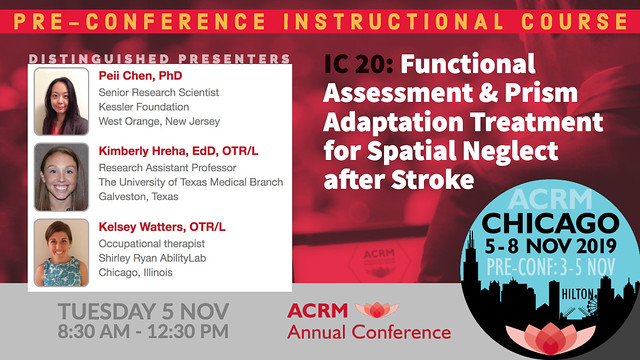
In this instructional course, we will first discuss the definition of spatial neglect and emphasize the clinical impact on stroke survivors. Next, we will explain the KF-NAP and offer participants the opportunity to practice using the assessment through access to patient cases via video. After, the KF-PAT will be introduced. Small groups will now learn to administer this treatment protocol by actually practicing with the equipment. Conclusions will be a discussion the practical implications of using both protocols in an inpatient rehabilitation facility.
Learn more >>
IC 27: Conceptualization and Application of Patient Reported Outcomes in Clinical and Research Venues >>
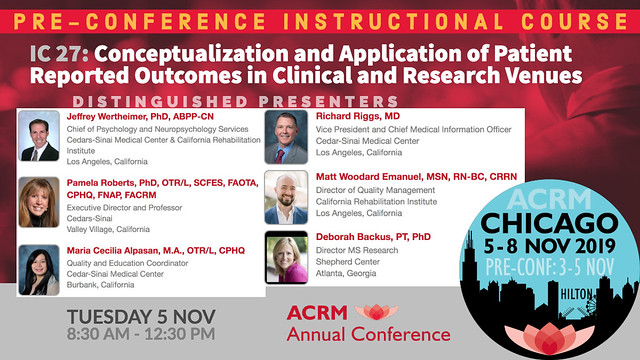
This course will focus on the use of patient reported outcomes (PROs) in clinical and research rehabilitation settings. An introduction to psychometric properties associated with PROs, selection of appropriate PRO measurements, and the significance of the inclusion of PROs in the care of the rehabilitation patient is discussed. Examples are provided to highlight lessons learned in systematizing outcome collection and integration into the electronic health record.
Learn more >>
LEARN MORE | REGISTER | BOOK HOTEL | ONLINE PROGRAM
ACRM 96th Annual Conference | Progress in Rehabilitation Research
CORE: 5 – 8 NOV 2019 // CHICAGO USA // PRE-CONFERENCE: 3 – 5 NOV 2019



